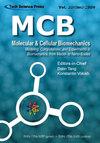Cyclic Stretch Induces Inflammatory Cytokines via the Oxidative Stress and NF-ΚB Pathways Activation in Human Keratoconic Fibroblasts
Q4 Biochemistry, Genetics and Molecular Biology
引用次数: 1
Abstract
The cornea is a load-bearing tissue. Lower biomechanical properties in the local tissue of keratoconic cornea evoke mechanical stress increase. Inflammatory cytokines have been shown to be over-expressed in patients with keratoconus. However, how mechanical stimuli are involved in the production of inflammatory cytokines in keratoconus remains unclear. The objective of the study is to determine the role of mechanical stretch in the regulation of inflammatory cytokines and the underlying mechanisms in keratoconus. Human keratoconic fibroblasts (hKCFs) were subjected to 12% cyclic mechanical stretch at 0.1 Hz or in static conditions as controls. N-acetyl cysteine (NAC) and pyrrolidine dithiocarbamate and pyrrolidine dithiocarbamate (PDTC) were used to inhibit reactive oxygen species (ROS) production and NF-κB pathway respectively. ROS production was measured using 2’,7’-dichlorodihydrofluorescindiacetate probe. Conditioned media and cell lysates were collected for protein assessment. Cyclic stretch-induced a higher production of intercellular cell adhesion molecule-1 (ICAM-1), tumor necrosis factor α (TNF-α), interleukin (IL)-6, and IL-8 in hKCFs than static controls. ROS was also elevated in response to cyclic stretch. Inhibition of ROS or NF-κB attenuated stretch-induced ICAM-1, TNF-α, IL-6, and IL-8. Inhibition of stretch-induced ROS production by NAC also attenuated NF-κB activation. Our findings suggest that mechanical stretch may induce the release of inflammatory cytokines by activating oxidative stress and NF-kB pathway, and ROS may positively control NF-κB signaling. Over-expression of inflammatory cytokines induced by mechanical stretch may play a role in progression of keratoconus.循环拉伸通过氧化应激和NF-ΚB通路激活诱导人角膜结缔组织成纤维细胞炎症因子
角膜是一种承重组织。较低的生物力学性能在局部角膜组织引起机械应力增加。炎性细胞因子已被证明在圆锥角膜患者中过度表达。然而,机械刺激如何参与圆锥角膜炎症细胞因子的产生尚不清楚。本研究的目的是确定机械拉伸在圆锥角膜炎症细胞因子调节中的作用及其潜在机制。人类角膜原纤维细胞(hKCFs)在0.1 Hz或静态条件下接受12%的循环机械拉伸作为对照。n -乙酰半胱氨酸(NAC)和吡咯烷二硫代氨基甲酸酯(PDTC)分别抑制活性氧(ROS)的产生和NF-κB通路。用2 ',7 ' -二氯二氢荧光indiacetate探针测定ROS的生成。收集条件培养基和细胞裂解液用于蛋白质评估。与静态对照相比,循环拉伸诱导hkcf中细胞间细胞粘附分子-1 (ICAM-1)、肿瘤坏死因子α (TNF-α)、白细胞介素(IL)-6和IL-8的产生更高。循环拉伸时ROS也升高。抑制ROS或NF-κB可减弱拉伸诱导的ICAM-1、TNF-α、IL-6和IL-8。NAC对拉伸诱导的ROS产生的抑制也减弱了NF-κB的激活。我们的研究结果表明,机械拉伸可能通过激活氧化应激和NF- kb途径诱导炎症细胞因子的释放,而ROS可能正调控NF-κB信号。机械拉伸诱导炎性细胞因子的过度表达可能在圆锥角膜的发展过程中起作用。
本文章由计算机程序翻译,如有差异,请以英文原文为准。
求助全文
约1分钟内获得全文
求助全文
来源期刊

Molecular & Cellular Biomechanics
CELL BIOLOGYENGINEERING, BIOMEDICAL&-ENGINEERING, BIOMEDICAL
CiteScore
1.70
自引率
0.00%
发文量
21
期刊介绍:
The field of biomechanics concerns with motion, deformation, and forces in biological systems. With the explosive progress in molecular biology, genomic engineering, bioimaging, and nanotechnology, there will be an ever-increasing generation of knowledge and information concerning the mechanobiology of genes, proteins, cells, tissues, and organs. Such information will bring new diagnostic tools, new therapeutic approaches, and new knowledge on ourselves and our interactions with our environment. It becomes apparent that biomechanics focusing on molecules, cells as well as tissues and organs is an important aspect of modern biomedical sciences. The aims of this journal are to facilitate the studies of the mechanics of biomolecules (including proteins, genes, cytoskeletons, etc.), cells (and their interactions with extracellular matrix), tissues and organs, the development of relevant advanced mathematical methods, and the discovery of biological secrets. As science concerns only with relative truth, we seek ideas that are state-of-the-art, which may be controversial, but stimulate and promote new ideas, new techniques, and new applications.
 求助内容:
求助内容: 应助结果提醒方式:
应助结果提醒方式:


